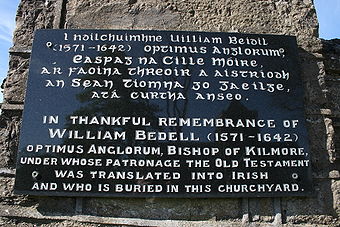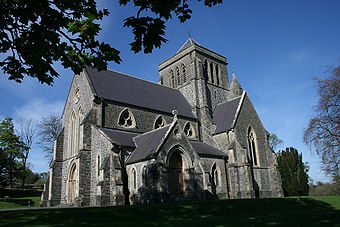
William Bedell
Encyclopedia

Early life
He was born at Black NotleyBlack Notley
Black Notley is a village and civil parish in Essex, England. It is located approximately south of Braintree and is north-northeast from the county town of Chelmsford. The village is in the district and parliamentary constituency of Braintree...
in Essex, and educated at Emmanuel College, Cambridge
Emmanuel College, Cambridge
Emmanuel College is a constituent college of the University of Cambridge.The college was founded in 1584 by Sir Walter Mildmay on the site of a Dominican friary...
, where he was a pupil of William Perkins. He became a fellow of Emmanuel in 1593, and took orders. In 1607 he was appointed chaplain to Sir Henry Wotton
Henry Wotton
Sir Henry Wotton was an English author and diplomat. He is often quoted as saying, "An ambassador is an honest gentleman sent to lie abroad for the good of his country." -Life:The son of Thomas Wotton , brother of Edward Wotton, 1st Baron Wotton, and grandnephew of the diplomat...
, then English ambassador at Venice
Venice
Venice is a city in northern Italy which is renowned for the beauty of its setting, its architecture and its artworks. It is the capital of the Veneto region...
, where he remained for four years, acquiring a great reputation as a scholar and theologian
Theology
Theology is the systematic and rational study of religion and its influences and of the nature of religious truths, or the learned profession acquired by completing specialized training in religious studies, usually at a university or school of divinity or seminary.-Definition:Augustine of Hippo...
.
He translated the Book of Common Prayer
Book of Common Prayer
The Book of Common Prayer is the short title of a number of related prayer books used in the Anglican Communion, as well as by the Continuing Anglican, "Anglican realignment" and other Anglican churches. The original book, published in 1549 , in the reign of Edward VI, was a product of the English...
into Italian
Italian language
Italian is a Romance language spoken mainly in Europe: Italy, Switzerland, San Marino, Vatican City, by minorities in Malta, Monaco, Croatia, Slovenia, France, Libya, Eritrea, and Somalia, and by immigrant communities in the Americas and Australia...
, and was on terms of close friendship with the reformer, Paolo Sarpi
Paolo Sarpi
Fra Paolo Sarpi was a Venetian patriot, scholar, scientist and church reformer. His most important roles were as a canon lawyer and historian active on behalf of the Venetian Republic.- Early years :...
. He wrote a series of sermons with Fulgenzio Micanzio
Fulgenzio Micanzio
Fulgenzio Micanzio was a Venetian Servite friar and theologian. A close associate of Paolo Sarpi, he undertook correspondence for Sarpi and became his biographer...
, Sarpi's disciple. In 1616 he was appointed to the rectory of Horningsheath (near Bury St Edmunds, where he had previously worked), which he held for twelve years.
Ireland
In 1627, he became provostProvost (education)
A provost is the senior academic administrator at many institutions of higher education in the United States, Canada and Australia, the equivalent of a pro-vice-chancellor at some institutions in the United Kingdom and Ireland....
of Trinity College, Dublin
Trinity College, Dublin
Trinity College, Dublin , formally known as the College of the Holy and Undivided Trinity of Queen Elizabeth near Dublin, was founded in 1592 by letters patent from Queen Elizabeth I as the "mother of a university", Extracts from Letters Patent of Elizabeth I, 1592: "...we...found and...
despite having no prior connection with Ireland. The provostship paid roughly the same as his Horningsheath rectory and he clung to his living in Suffolk until forced to surrender it on grounds of benefice
Benefice
A benefice is a reward received in exchange for services rendered and as a retainer for future services. The term is now almost obsolete.-Church of England:...
. Despite his evangelical Protestant wish to advance Irish Reformation, Bedell decreed a chapter of the Irish New Testament to be read at dinner by a native Irish speaker and Irish prayers in the Chapel.

Bishop of Kilmore and Ardagh
The Bishop of Kilmore and Ardagh was the Ordinary of the Church of Ireland diocese of Kilmore and Ardagh in the Province of Armagh. The Diocese of Kilmore comprised most of County Cavan and parts of counties Leitrim, Fermanagh, Meath and Sligo...
. He set himself to reform the abuses of his diocese
Diocese
A diocese is the district or see under the supervision of a bishop. It is divided into parishes.An archdiocese is more significant than a diocese. An archdiocese is presided over by an archbishop whose see may have or had importance due to size or historical significance...
, encouraged the use of the Irish language
Irish language
Irish , also known as Irish Gaelic, is a Goidelic language of the Indo-European language family, originating in Ireland and historically spoken by the Irish people. Irish is now spoken as a first language by a minority of Irish people, as well as being a second language of a larger proportion of...
, and personally undertook the duties generally discharged by the bishop's lay chancellor. He is noted for commissioning the translation of the Bible into the Irish Language, which translation was undertaken by the Protestant Rector of Templeport parish, Muircheartach Ó Cionga
Muircheartach Ó Cionga
Muircheartach Óg Ó Cíonga, Old Testament translator and Irish scribe, c. 1562-c.1639.-Overview:Ó Cíonga was a member of an Irish bardic family, who were residents of the barony of Kilcoursey, County Offaly, known as Fox's Country...
. He would only appoint Irish speakers to parishes.
In 1633, he resigned the see of Ardagh
Bishop of Ardagh
The Bishop of Ardagh was a separate episcopal title which took its name after the village of Ardagh in County Longford, Ireland. It was used by the Roman Catholic Church until 1756, and intermittently by the Church of Ireland until 1839....
, retaining the more primitive bishopric of Kilmore
Bishop of Kilmore
The Bishop of Kilmore is an episcopal title which takes its name after the parish of Kilmore in County Cavan, Ireland. In the Roman Catholic Church it remains a separate title, but in the Church of Ireland it has been united with other bishoprics.-History:...
where he had encountered some opposition from Anglicans and Catholics alike for his undertaking of reaching out to the Irish, he set about rebuilding the neglected church buildings throughout the diocese, where in 1638 he held a synod of all the Anglican priests and officers within the diocese to discuss lax discipline and was asked by the court of the Plantation Commission to 'lay out' the town of Virginia, County Cavan
Virginia, County Cavan
Virginia is a small town of 3,939 inhabitants in County Cavan, Ireland. It was founded at Aghanure during the Plantation of Ulster and was named Virginia after Queen Elizabeth I of England....
after complaints from the residents there about the patentee landlords failure to build the town and provide a church for worship. Bedell was a man of simple life, often walking miles on foot, or on horse traveling the dangerous byways. Bedell provided assistance to converts to Protestantism enabling them to study for the ministry.
Bedell sided with the Catholics of Kilmore against the excess of Dr Alan Cooke, the incumbent chancellor of the diocese. However the church courts found that Cooke had legally acquired the right as chancellor, and the Bishop was unable to remove him.
With the outbreak of the 1641 Rebellion
Irish Rebellion of 1641
The Irish Rebellion of 1641 began as an attempted coup d'état by Irish Catholic gentry, who tried to seize control of the English administration in Ireland to force concessions for the Catholics living under English rule...
, the local warlords, led by the O'Reillys, took control of the area. The O'Reillys "gave comfortable words to the Bishop" and Bedell's house at Kilmore in County Cavan
County Cavan
County Cavan is a county in Ireland. It is part of the Border Region and is also located in the province of Ulster. It is named after the town of Cavan. Cavan County Council is the local authority for the county...
was left untouched becoming a place of refuge for those seeking shelter from the rebel insurgents. In the end, however, the rebels insisted upon the dismissal of all who had taken shelter in his house, and on the bishop's refusal he was seized and imprisoned with some others to the nearby island castle of Lough Oughter
Lough Oughter
Lough Oughter is a lake, or complex of lakes, in County Cavan covering approximately 8931 hectares. It is on the River Erne, and forms the southern part of the Lough Erne complex...
, Cloughoughter Castle
Cloughoughter Castle
Cloughoughter Castle is a ruined circular castle, situated on a small island in Lough Oughter, 4 kilometres east of the town of Killeshandra in County Cavan, Ireland.-History:...
. Here he was detained for several weeks, and when released on signing a deposition and a remonstrance from his captors, 'pleading on their behalf for graces from King Charles'. Bedell was released into the care of his friend Rev. Denis Sheridan, continued to suffer from the effects from being in the drafty and damp castle. Bishop Bedell died on 7 February 1642 and was afforded the dignity by his captors of being buried next to his wife Leah at Kilmore, where he received an honourable funeral in the presence of his O'Raghallaigh (O'Reilly) captors. At his funeral, a Roman Catholic priest, Father Farrelly, was heard to say, "May my soul be with Beddell's".
The story of his life was written by Bishop Gilbert Burnet
Gilbert Burnet
Gilbert Burnet was a Scottish theologian and historian, and Bishop of Salisbury. He was fluent in Dutch, French, Latin, Greek, and Hebrew. Burnet was respected as a cleric, a preacher, and an academic, as well as a writer and historian...
in 1685, and also by his elder son (ed. T. W. Jones, for the Camden Society
Camden Society
The Camden Society, named after the English antiquary and historian William Camden, was founded in 1838 in London to publish early historical and literary materials, both unpublished manuscripts and new editions of rare printed books....
, 1872). Bishop William Bedells Last Will and Testament is available through the UK National Archives.

